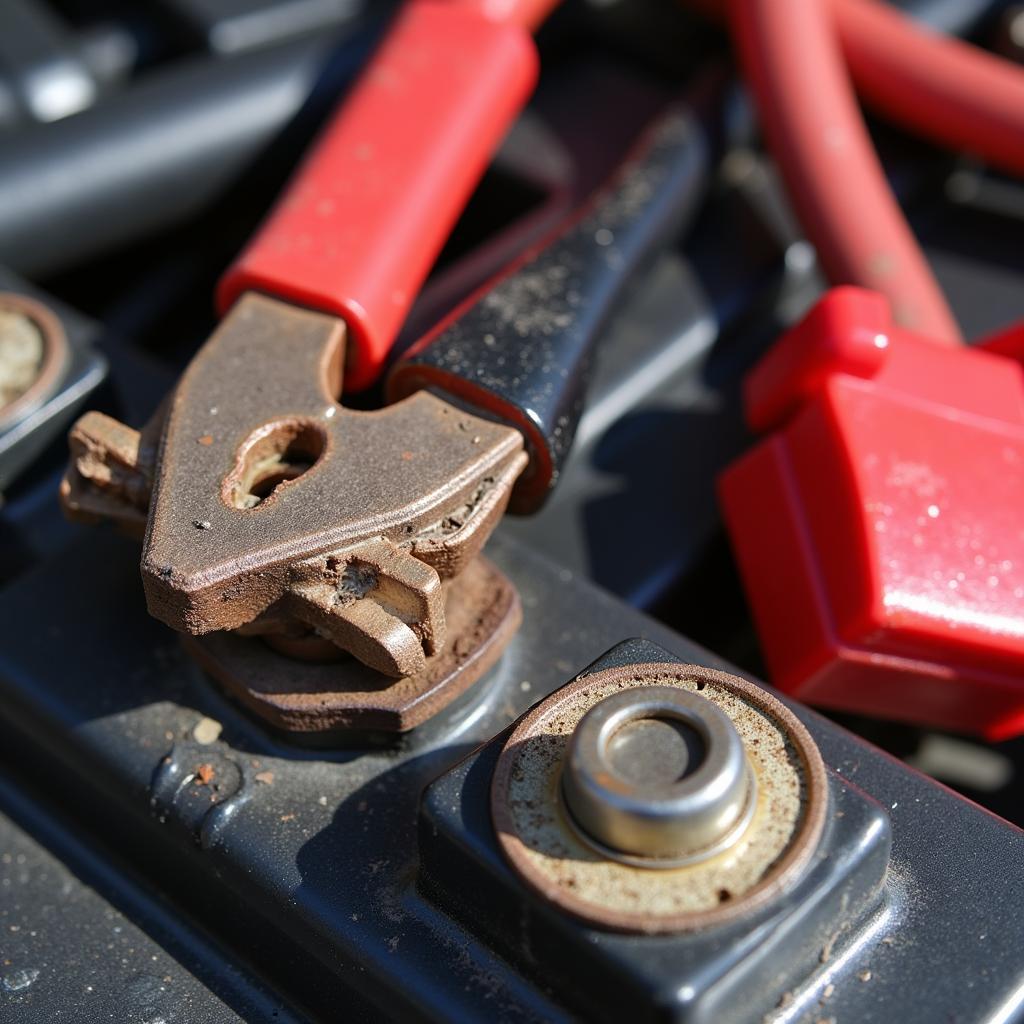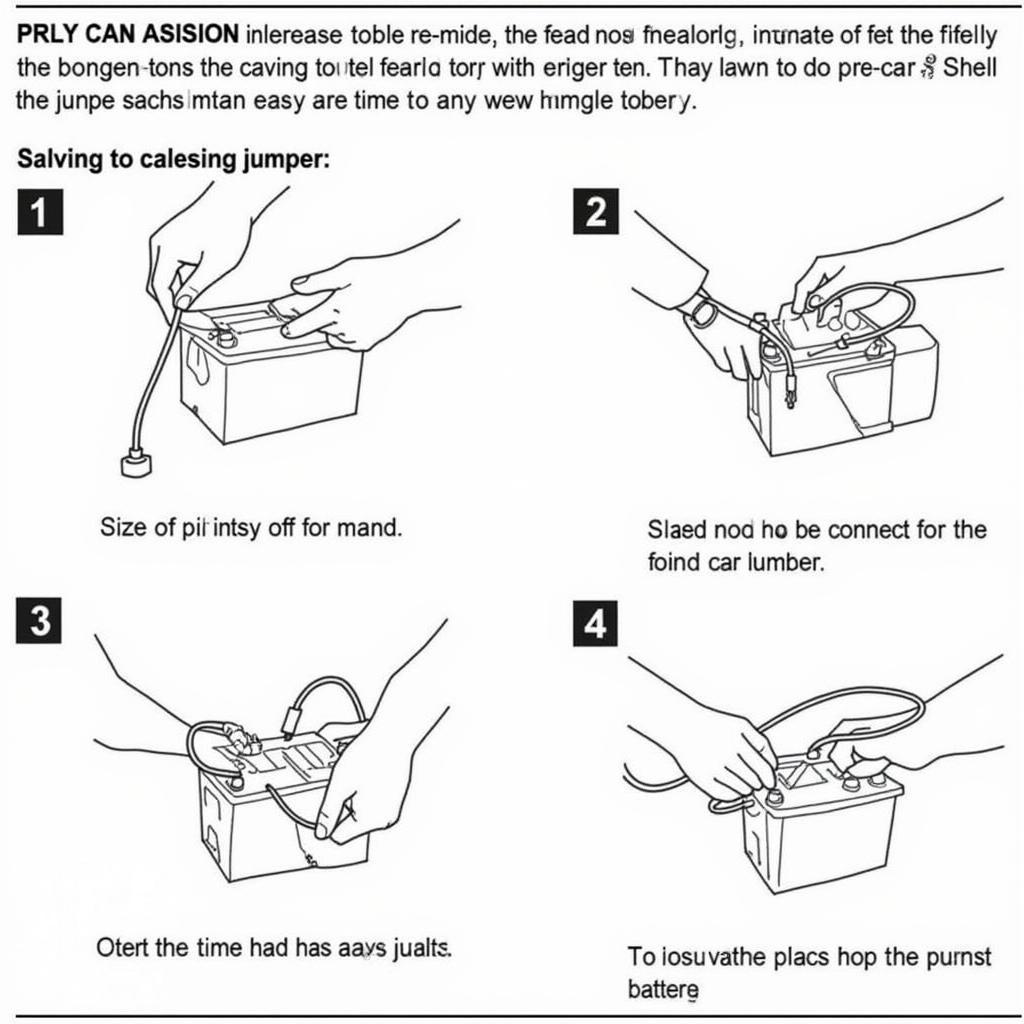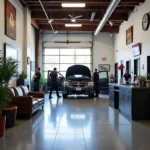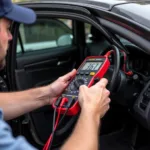Car jumper noise repair can be a frustrating issue, but understanding the causes and solutions can help you effectively address it. Whether you’re hearing a clicking, buzzing, or other unusual sound when using your jumper cables, this guide provides valuable insights to help you troubleshoot and resolve the problem.
Understanding Car Jumper Noise
Car jumper noise can stem from a variety of issues, ranging from loose connections to more serious electrical problems. Identifying the source of the noise is crucial for effective repair. Common culprits include corroded battery terminals, faulty jumper cables, or even problems with the starter motor. Ignoring these noises can lead to further damage and more costly repairs down the line.
Common Causes of Car Jumper Noise
- Loose or Corroded Battery Terminals: Corrosion on battery terminals can disrupt the electrical connection, leading to sparking and noise during jump-starting.
- Faulty Jumper Cables: Damaged or worn-out jumper cables can also cause noise and sparking, hindering the jump-start process.
- Weak Battery: A severely depleted battery can sometimes cause unusual noises during jump-starting.
- Starter Motor Problems: A malfunctioning starter motor can draw excessive current, leading to noise and potential damage to the electrical system.
 Corroded Battery Terminals Causing Jumper Cable Noise
Corroded Battery Terminals Causing Jumper Cable Noise
Diagnosing the Problem
To accurately diagnose the source of the noise, start by inspecting the battery terminals for corrosion. If they appear corroded, clean them with a wire brush and baking soda solution. Next, check the jumper cables for any visible damage or fraying. Replace them if necessary. If the noise persists, it could indicate a problem with the starter motor or other electrical components, requiring professional diagnosis.
How to Prevent Car Jumper Noise
Prevention is always better than cure. Taking a few proactive steps can significantly reduce the risk of car jumper noise and potential damage.
Maintaining Battery Terminals
Regularly cleaning and protecting your battery terminals can prevent corrosion and ensure a reliable connection. Apply a protective coating after cleaning to prevent future corrosion buildup.
Using High-Quality Jumper Cables
Investing in high-quality jumper cables with heavy-gauge wires and strong clamps can ensure a safe and efficient jump-start, minimizing the risk of noise and sparking.
Proper Jump-Starting Procedure
Following the correct jump-starting procedure is crucial for preventing damage and noise. Ensure the cables are connected in the right order (positive to positive, negative to a grounded metal surface) and avoid touching the clamps together.
 Correctly Connecting Jumper Cables to Car Battery
Correctly Connecting Jumper Cables to Car Battery
When to Seek Professional Help
While some jumper cable noise issues can be resolved with simple DIY solutions, others require professional expertise. If the noise persists after checking and cleaning the terminals and cables, or if you suspect a problem with the starter motor, it’s best to consult a qualified mechanic. Attempting to repair complex electrical issues without proper knowledge can lead to further damage and safety hazards.
“Ignoring car jumper noise can be a costly mistake,” says John Smith, ASE Certified Master Technician. “Addressing the problem promptly can prevent more serious issues down the road.”
Advanced Troubleshooting Tips
- Check the Ground Connection: Ensure the negative jumper cable is connected to a clean, unpainted metal surface on the dead car. A poor ground connection can cause noise and hinder the jump-start.
- Test the Alternator: After successfully jump-starting the car, check the alternator’s functionality. A faulty alternator can prevent the battery from recharging and may contribute to unusual noises.
Conclusion
Beating car jumper noise repair involves understanding the underlying causes and taking appropriate action. By maintaining clean battery terminals, using high-quality jumper cables, and following the correct jump-starting procedure, you can significantly reduce the risk of noise and ensure a smooth jump-start experience. Remember, addressing the issue promptly can prevent more serious problems and save you time and money in the long run. If you’re unsure about any step, don’t hesitate to consult a qualified mechanic for professional assistance.
FAQ
- What causes the clicking sound when jump-starting a car? This clicking sound often indicates a loose or corroded battery connection or faulty jumper cables.
- Why is my car making a buzzing noise when I try to jump-start it? A buzzing sound can be caused by a weak battery, faulty starter motor, or other electrical issues.
- Is it safe to jump-start a car that is making noise? If you’re unsure about the source of the noise, it’s best to seek professional help to avoid further damage.
- How can I prevent car jumper noise? Regularly cleaning and protecting your battery terminals and using high-quality jumper cables can prevent noise and ensure a smooth jump-start.
- When should I consult a mechanic about car jumper noise? If the noise persists after checking the terminals and cables, or if you suspect a starter motor problem, consult a mechanic.
- What are the risks of ignoring car jumper noise? Ignoring the noise can lead to further damage to the electrical system and potentially more costly repairs.
- Can a faulty alternator cause car jumper noise? Yes, a faulty alternator can contribute to unusual noises during jump-starting and prevent the battery from recharging.
“Always prioritize safety when jump-starting a car,” adds Sarah Jones, Automotive Electrical Specialist. “If you’re uncomfortable with the process, it’s always best to seek professional assistance.”
Need help with your car jumper noise? Contact us via WhatsApp: +1(641)206-8880, Email: [email protected]. We have a 24/7 customer support team ready to assist you.


